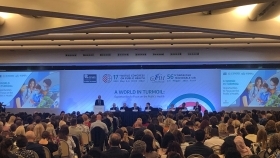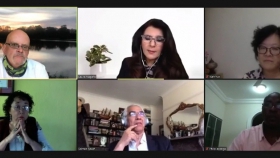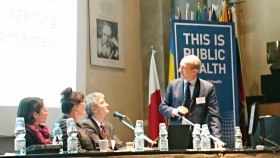
by strengthening education and training
of public health professionals
for both practice and research



The Association of Schools of Public Health in the European Region (ASPHER)
ASPHER is the key independent European organisation dedicated to strengthening the role of public health by improving education and training of public health professionals for both practice and research.Secretariat updates
Giulia Sesa1,2, Jose Martin-Moreno, 2,3,4 John Middleton 2, 5 *
- European Public Health, Department of International Health, CAPHRI, FHML, Maastricht University
- ASPHER COVID-19 Task Force, Brussels, Belgium
- Department of Preventive Medicine and INCLIVA-Clinical Hospital, University of Valencia, Valencia, Spain
- Honours Committee and COVID-19 Task Force, Association of Schools of Public Health in the European Region (ASPHER), Brussels, Belgium.
- Association of Schools of Public Health in the European Region, Brussels, Belgium
* Corresponding Author: john.middleton@aspher.org
On May 13th 2021, the CDC claimed that fully vaccinated individuals could resume their lives as before the pandemic.1 The category of fully vaccinated individuals includes those who have received the second dose of a 2-dose-schedule vaccine or a single dose vaccine, and two weeks have passed from the injection.2 The advice delivered from the CDC entailed the abolition of mandatory physical distancing measures, mask-wearing both outdoors and indoors unless mandated by ¨federal, state, local, tribal, or territorial laws, rules, and regulations, including local business and workplace guidance¨.2 Furthermore, mask-wearing is still mandatory in transportation hubs, in the healthcare setting, and when travelling on public transport.2 The recent advice also suspended testing and quarantining when travelling in the US for fully vaccinated individuals.2 When considering international travel, fully vaccinated individuals shall present a negative test result or COVID-19 recovery certificate before departure and get tested 3 to 5 days after arrival.2 Fully vaccinated individuals are not required to self-quarantine after international flights to the US.2 Furthermore, the recent advice also recommended that fully vaccinated individuals, who entered into contact with someone with COVID-19, do not have to get tested or stay away from others.2 Nonetheless, the former does not apply to individuals residing or working in homeless shelters, detention or correctional institutes.2
According to the CDC, decisions regarding fully vaccinated individuals have been taken based on the efficacy and effectiveness of COVID-19 vaccines in preventing infection and severe illness, the safety of COVID-19 vaccines, and the time the immune system takes to build immunity, and the success of the widespread availability of vaccines free of charge.2,3 When considering the efficacy and effectiveness of COVID-19 vaccines, the CDC based its conclusions on animal challenge studies, clinical trials, and/or real-world data mainly originating from the US, UK, Israel, and Denmark.4 Additionally, the CDC advised the abolition of mandatory prevention measures based on societal costs considerations, despite recognising societal benefits in reducing COVID-19 transmission.4 A CDC unpublished study claims that ¨increasing vaccination rates may allow for the phasing out of some prevention measures as coverage increases¨.4 Given this latter, the CDC calls for a balanced and stepwise approach to protection measures' removal.4 The CDC also recognised populations' behaviours and attitudes towards COVID-19 vaccines, recognising the need to foster immunisation uptake and confidence.4 Allowing citizens to go back to ¨normal¨ life may act as an incentive in vaccination.4 Ultimately, when considering travel advice, the CDC acknowledges all scientific evidence regarding the effectiveness of vaccines as well as societal and individual factors.4 In particular, reflections are made regarding the burden posed by COVID-19 testing on public health resources and the individual consequences of an unnecessary quarantine.4 Despite the removal of quarantining measures after arrival to the US for fully vaccinated people, the CDC still demands COVID-19 tests 3 to 5 days after arrival, given the ¨global circulation of SARS-CoV-2 variants and vaccine performance against emerging variants¨.4
Such measures are of concern when considering the lack of evidence regarding the role of COVID-19 vaccines in fully preventing transmission, the unknown effectiveness of vaccines against current and potential COVID-19 variants, and that individuals with weakened immune systems may not develop antibodies after immunisation.2 Furthermore, the number of individuals required to achieve herd immunity and the length of protection obtained via COVID-19 vaccination remains unknown.2 Another matter of concern lies in travel measures and the national application of the CDC guidance, hence applying both to areas in the US with high and low vaccination rates.5 Vaccinated individuals might travel to zones with low vaccination coverage and/or a high incidence of COVID-19 variants, becoming a transmission vector.5 No evidence is given that the abolition of mandatory prevention measures will reduce COVID-19 vaccine hesitancy levels.5 The CDC also appears to neglect the impact of social norms on COVID-19 prevention measures; i.e. if many individuals stop physically distancing, more individuals are likely to do so even if unvaccinated.5 There has been immense confusion stemming from the guidance delivered from the CDC on May 13th 2021. Firstly, it was contradictory to the guidelines released by the CDC on May 7th 2021.6 The CDC strategy went ¨from over-caution to abandoning all caution¨.5 Secondly, questions such as the difference between demanding mask-wearing in transportation hubs like airports and abolishing them in gyms and churches remain unclear.6 Thirdly, citizens might believe that the new CDC guidance primarily targets mask-wearing when the prime objective is fostering vaccination.7 For instance, chain stores such as Walmart and the US states of Virginia, Maryland, Michigan, Ohio, and North Carolina terminated their indoor mask-wearing obligations.6 Ultimately, the CDC seems to be at odds with President Biden's politics that refrains from employing vaccine certificates.5 Consequently, the question is how to ensure, and enforce, that citizens who are not following COVID-19 prevention measures are fully vaccinated.
The CDC is a hugely respected global source of expert public health advice. Governments, health services, commercial and business organisations listen and act when CDC pronounces. CDC creates a potentially huge negative impact on the control of the pandemic by its recommendation to abandon mandatory prevention measures. In the European setting, countries are at varying stages in the implementation of vaccination programmes, generally at an inadequate level to prevent transmission of the virus, and in the presence of new variants of concern. All European countries therefore require social distancing, masking, and programmes of gradual reopening, alongside their build up of vaccination.
ASPHER, as Europe’s representative organisation for Schools of Public Health, believes the guidance from CDC to be insufficiently substantiated, erroneously postulated and potentially damaging in the global fight against COVID-19.
We are also struck by the passivity and apparent apparent nihilism with which the WHO has received this announcement. Major changes of policy such as this require a much stronger international consensus and need to be based on much stronger evidence shared widely in the international community.
International authorities must exercise caution and an evidence-based approach when considering prevention measures' removal. They must be transparent in the referencing and the standard of evidence they accept, on which they are basing their recommendations.
ASPHER recognises the need to establish clear and adequate risk communication strategies, and calls for much stronger international collaboration and coherence in global public health action.
Download the PDF version of the statement here
References:
- CDC. Interim public health recommendations for fully vaccinated people [Internet]. 2021 [cited 2021May20]. Available from: https://www.cdc.gov/coronavirus/2019-ncov/vaccines/fully-vaccinated-guidance.html
- CDC. When You've Been Fully Vaccinated [Internet]. Centers for Disease Control and Prevention. Centers for Disease Control and Prevention; 2021 [cited 2021May20]. Available from: https://www.cdc.gov/coronavirus/2019-ncov/vaccines/fully-vaccinated.html
- CDC. Key Things to Know About COVID-19 Vaccines [Internet]. Centers for Disease Control and Prevention. Centers for Disease Control and Prevention; 2021 [cited 2021May20]. Available from: https://www.cdc.gov/coronavirus/2019-ncov/vaccines/keythingstoknow.html
- CDC. Science Brief: Background Rationale and Evidence for Public Health Recommendations for Fully Vaccinated People [Internet]. Centers for Disease Control and Prevention. Centers for Disease Control and Prevention; 2021 [cited 2021May20]. Available from: https://www.cdc.gov/coronavirus/2019-ncov/science/science-briefs/fully-vaccinated-people.html?CDC_AA_refVal=https%3A%2F%2Fwww.cdc.gov%2Fcoronavirus%2F2019-ncov%2Fmore%2Ffully-vaccinated-people.html
- Gostin LO. Op-Ed: What Was CDC Thinking With Its New Mask Guidance? [Internet]. Medical News. MedpageToday; 2021 [cited 2021May20]. Available from: https://www.medpagetoday.com/infectiousdisease/covid19/92596
- Chapple-McGruder T, Yamey G. CDC's Abrupt Change to Mask Guidelines Puts People at Risk [Internet]. Time. Time; 2021 [cited 2021May20]. Available from: https://time.com/6049612/cdc-mask-guidance-mistake/?utm_medium=email&utm_source=sfmc&utm_campaign=newsletter%2Bcoronavirus%2Bdefault%2Bac&utm_content=%2B%2B%2B20210519%2B%2B%2Bbody&et_rid=125899662
- Allen M. Fauci says people are "misinterpreting" the new CDC mask guidance [Internet]. Axios. 2021 [cited 2021May20]. Available from: https://www.axios.com/fauci-mask-covid-cdc-guidance-30bd0552-e9d3-43e0-93e4-2ae02ae9ec61.html
Terms of use · Transparency statement ·Tel: +32 2 735 0890 ·Skype: ASPHERskype ·Mail: office@aspher.org ·Share:
ADDRESS
Aspher SecretariatUM Brussels Campus
Av de l'Armée / Legerlaan 10
BE-1040 Brussels





